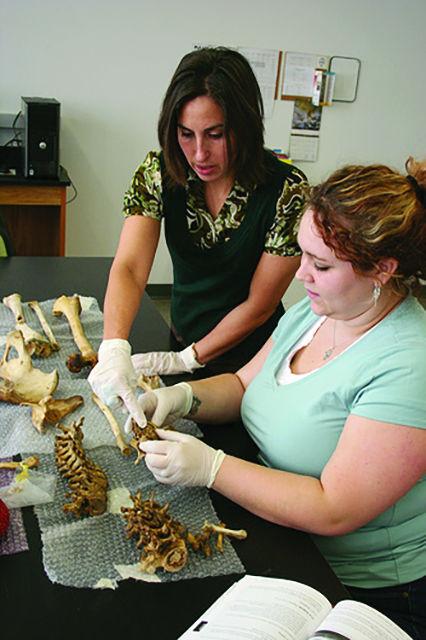Pale, skinless, silent — there’s something in Park Shops that orientation leaders mention only briefly before moving on. It is not something often discussed, though it is often mislabeled when it is brought up.
Kept under lock and key, the bones of unidentified or murdered persons reside in the Forensic Analysis Lab, often incorrectly called the Body Lab. The lab works closely with law enforcement agencies and the medical examiner’s office in North Carolina working on most of the cases that require forensic anthropological consultations.
Headed by Ann Ross and Chelsey Juarez, the Forensic Analysis Lab handles open and cold cases for the state, some being high-profile death penalty cases according to Juarez.
“Another thing we do is — if it’s an unknown individual and they’re either in an advanced state of decomposition or completely skeletonized — develop a biological profile for that person,” Ross said.
The biological profile the lab develops includes age estimation at death, height, the individual’s ancestral origin and identifiable characteristics. When working on murder cases, the Forensic Analysis Lab does trauma analysis to determine what implement was used to murder the victim by looking at the remains. The lab does not always receive clean bones to examine though.
“A lot of times they are flesh … meaning our job is to remove the tissue so we can get down to the bone,” Ross said.
The Forensic Analysis Lab is one of several labs in Park Shops; a building originally intended for engineers but was retrofitted with lab suites when engineering made its move to Centennial Campus. There is an archaeology lab, a teaching lab where most of the teaching for osteology is done, an osteology lab where dry research is done and the Forensics Lab.
“The Forensic Analysis Lab is only accessible through badge entry,” Juarez said. “So there’s badge entry on the outside of the building to get into it, and then you actually have to go through another lab, and once you’re in that lab you swipe a secret door and then go in.”
It is important for the lab to maintain security — their caseload has drastically increased in recent years, leaving them inundated with cases. As these are criminal cases, security must be high or Ross and Juarez could lose their privilege and relationship with the state.
“It’s very important that we can guarantee that nobody has fiddled around with the remains, they have to be secure,” Juarez said. “The reason security has to be so tight is because the lab has to maintain the chain of custody and essentially it’s Dr. Ross and myself, our reputations are on the line.”
The security measures and the delivery of remains via body transport services create an air of mystery around the lab, leading to rumors of cadavers hidden in Park Shops. Ross emphasizes to those who ask that the lab is not a body lab; they do not have full cadavers in the workspace.
“In my view, a body lab would be more like a cadaver lab, where you would maybe do gross anatomy or something, but ours is a Forensic Analysis Lab, so our role is to actually help in forensic investigations for the state,” Ross said.
Though it is rare for undergraduates to work with the lab, they do have a number of graduate students assisting them. Ross offers a class in advanced forensic anthropology for students who may want to look into the discipline as well.
“We’re in a really good position that we are curating cases from the Medical Examiner’s Office,” Ross said. We’re in a unique position to use those to teach how to do what we do, and not many universities have that. This is really unique in that a lot of these individuals perished under bad conditions, but they are being used to actually help and move the science forward and help students maybe get an insight in.”
The uniqueness and quality of the labs at NC State is one of the reasons Juarez said she made the decision to move to Raleigh and work here. Juarez earned her doctorate at the University of California at Santa Cruz in physical anthropology with a specialization in forensic anthropology
“The labs here are state-of-the-art,” Juarez said. “If you go to other famous labs, the labs that we have here at State are better. We have better equipment; we have more beautiful, more technologically equipped labs. It’s top of the line.”
The lab is equipped with a $50,000 microscope, a bone density scanner, an X-ray gun, an X-ray unit and plenty of software. The lab also works with the Forensic Science Institute, providing students with a unique and valuable opportunity.
“The students of NC State, whether they are undergrads or grad students, if they are interested in forensic anthropology at all, they really need to take advantage of the resources that they have, because the lab here is one of the best, probably the best that I have ever seen in the nation,” Juarez said.








